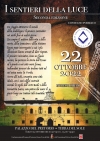- Dettagli
- Scritto da Barbara de Munari
- Visite: 463
Cari Associati, Cari Amici,
il nostro vice-presidente, Manuele Gragnolati, ha il piacere di informarvi che è comparso l'Oxford handbook of Dante, in co-direzione con Francesca Southerden ed Elena Lombardi.
Manuele e Francesca ci avevano presentato la loro opera con una comunicazione fatta in occasione del nostro seminario del 16 dicembre 2020.
Qui trovate la copertina, l’indice e la descrizione dell’opera.
Società Dantesca di Francia
Chers sociétaires, chers amis,
Notre vice-président, Manuele Gragnolati, a le plaisir de vous informer de la parution de l'Oxford handbook of Dante, qu'il co-dirige avec Francesca Southerden et Elena Lombardi.
Manuele et Francesca nous avaient présenté cet ouvrage lors de leur communication donnée à l'occasion de notre séminaire du 16 décembre 2020.
Vous trouverez en pièce jointe la couverture, la table des matières ainsi que la description de l'ouvrage.
Bien cordialement,
SDdF
The Oxford Handbook of Dante, edited by Manuele Gragnolati, Elena Lombardi, and Francesca Southerden (Oxford: Oxford University Press, 2021)
The Oxford Handbook of Dante contains forty-four specially written chapters that provide a thorough and creative reading of Dante's oeuvre. It gathers an intergenerational and international team of scholars encompassing diverse approaches from the fields of Anglo-American, Italian, and continental scholarship and spanning several disciplines: philology, material culture, history, religion, art history, visual studies, theory from the classical to the contemporary, queer, post- and de-colonial, and feminist studies. The volume combines a rigorous reassessment of Dante's formation, themes, and sources, with a theoretically up-to-date focus on textuality, thereby offering a new critical Dante. The volume is divided into seven sections and seeks to challenge the Commedia-centric approach (the conviction that notwithstanding its many contradictions, Dante's works move towards the great reservoir of poetry and ideas that is the Commedia), in order to bring to light a non-teleological way in which these works relate amongst themselves. Plurality and the openness of interpretation appear as Dante's very mark, coexisting with the attempt to create an all-encompassing mastership. The Handbook suggests what is exciting about Dante now and indicate where Dante scholarship is going, or can go, in a global context.
https://global.oup.com/academic/product/the-oxford-handbook-of-dante-9780198820741?cc=gb&lang=en&
Introduction. Dante Unbound: A Vulnerable Life and the Openness of
Interpretation, Manuele Gragnolati, Elena Lombardi, and Francesca Southerden
Part I: Texts and Textuality
1: The author, Justin Steinberg
2: Memory, Lina Bolzoni
3: Reading, Mary Carruthers
4: Materiality of the text and manuscript culture, Martin Eisner
5: The manuscript tradition, or on editing Dante, Fabio Zinelli
6: Commentary (both by Dante and on Dante), Luca Fiorentini
7: Digital Dante, Akash Kumar
Part II: Dialogues
8: The Classics, Zygmunt G. Baranski
9: Roman de la Rose, Antonio Montefusco
10: Troubadours, William Burgwinkle
11: Early Italian lyric, Roberto Rea
12: Comic culture, Fabian Alfie
13: Visual culture, Gervase Rosser
Part III: Transforming Knowledge
14: Encyclopaedism, Franziska Meier
15: Medicine, Natascia Tonelli
16: Visual theory, Simon Gilson
17: The law, Diego Quaglioni
18: Politics, Tristan Kay
19: Philosophy and theology, Pasquale Porro
20: Religion, Alessandro Vettori
21: Poetry, Elena Lombardi
22: Florence and Rome, Giuliano Milani
23: Civitas/Community, Elisa Brilli
24: The Mediterranean, Karla Mallette
25: The East, Brenda Deen Schildgen
26: Exile, Johannes Bartuschat
27: Travelling/wandering/mapping, Theodore J. Cachey, Jr.
28: Dante's other worlds, Peter Hawkins
Part V: A passionate selfhood
29: Eschatological anthropology, Manuele Gragnolati
30: Language, Heather Webb
31: The mystical, Bernard McGinn
32: Bodies on fire, Cary Howie
Part VI: A non-linear Dante
33: The master narrative and its paradoxes, Nicolò Crisafi
34: Conversion, palinody, traces, Jennifer Rushworth
35: The lyric mode, Francesca Southerden
36: Errancy: A brief history of Dante's Ferm Voler, Teodolinda Barolini
Part VII: Nachleben
37: Translations, Martin McLaughlin
38: Dante and the performing arts, Rossend Arqués Corominas
39: Dante on screen, John David Rhodes
40: Modernist Dante, Daniela Caselli
41: Dante and the Shoah, Lino Pertile
42: Dante in Caribbean poetics: Language, power, race, Jason Allen-Paisant
43: Queering Dante, Gary Cestaro
44: A decolonial feminist Dante: Imperial historiography and gender, Marguerite Waller
- Dettagli
- Scritto da Barbara de Munari
- Visite: 341
Chers sociétaires, chers amis,
Nous vous communiquons une nouvelle initiative : un colloque intitulé "Dante, ses critiques, ses imitateurs", qui aura lieu en ligne les 25 et 26 mars 2021.
Bien cordialement,
SDdF
Il colloquio intitolato “Dante, i suoi critici, i suoi imitatori” si svolgerà on line il 25 e il 26 marzo 2021.
Società Dantesca di Francia
In collaborazione con l’Università Ca’ Foscari di Venezia
Videoconferenza, link su: http://ihrim.ens-lyon.fr/
Partners:
Ihrim
Università Clermont Auvergne
Università di Lyon
Pagina 7 di 11






